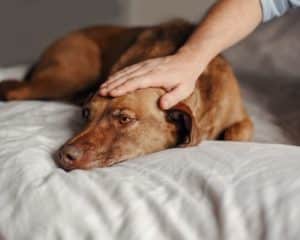We know that our canine companions are sensitive, intuitive creatures. They pick up on their owners’ emotional states, changes in routines, and their environment. It’s no wonder they are capable of experiencing a wide range of emotions and moods including depression. That’s why Pet Butler wants to help you identify the situations that are causing your pet’s depression.
What are common triggers of pet depression?
Changes to a dog’s environment are one of the most common causes of pet depression. Dogs are dependent on us and their familiar home base for comfort and stability. Something as simple as an environment change can cause a chain reaction. Changes like moving, going through a divorce, or returning to work can be unsettling to your pet.
One of the more common situations is the loss of another animal or family member. The absence of another companion can lead to signs of depression. Animals experience feelings of grief and loss though we don’t know exactly how they process the concept of death. Your pet can often sense a companion’s illness/death and respond by exhibiting behavioral changes consistent with pet depression. For pack animals such as dogs, it’s no surprise the loss of a bonded companion leads to sadness. Because dogs are so attuned to our moods, they may also respond to the physical manifestations of human grief such as crying, detachment, and lethargy.
Pet depression can be exhibited because of a simple shift of schedule causing their owner to not be home as often. Changes in routine brought upon by increased work demands can cause anxiety, stress, and boredom which lead to signs of pet depression. Dogs are creatures of habit and a change in their daily activities can be unnerving. They gain confidence and reap the physical and mental benefits of having a “job” and regular exercise. When those neurons and muscle fibers aren’t firing, hormones such as oxytocin, dopamine, and endorphins aren’t released, and signs of pet depression may be observed.

What if it isn’t pet depression?
Dogs can’t tell us when they are physically ill or in pain but changes in behavior offer clues. Some dogs that aren’t feeling well physically may show signs of pet depression. Endocrine disorders like hypothyroidism cause dogs to become sluggish and mopey. Neurological diseases such as seizure disorders or tumors affecting the central nervous system may cause mood changes. Anytime your pet exhibits a shift in their behavior that isn’t easily explicable, always rule out a medical problem by visiting the veterinarian. By determining the root cause of your dog’s depression, you can make changes to improve their mental health and well-being.
At Pet Butler, we want to help you give your pet the best care possible. That’s why we offer pet waste removal services so you can care for them why we do the dirty work. Sign up with your local Pet Butler today at Petbutler.com.

